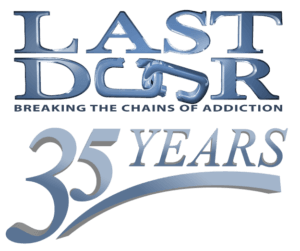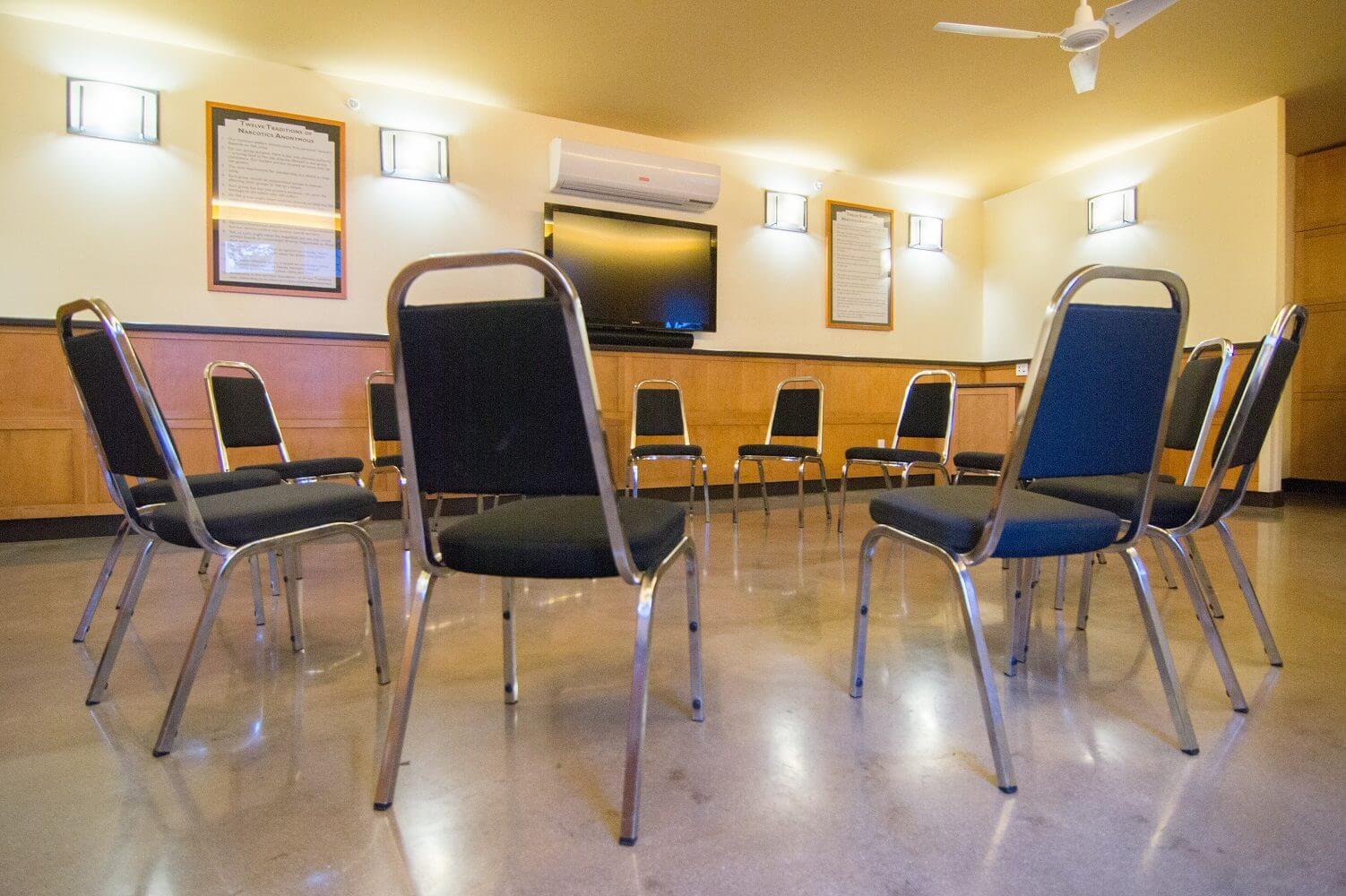Last Door’s 35 years of experience has created Canada’s premier addiction recovery treatment program. The clinical objectives are client centre for ultimate success for recovery.
What to expect in treatment
Addiction Treatment Clinical Objectives

Last Door Youth Program and Adult Program deliver an integrated range of biological and psychotherapeutic treatments for clients concurrently or historically diagnosed with Anxiety, ADHD, Schizophrenia, Bi-Polar, Operational Stress Injury, PTSD and Depression.
Group work, directed interventions, peer support and written exercises are the primary approaches, building a supportive environment to facilitate recovery. Therapeutic groups explore themes of loss, grief, self-esteem, communication, stress, sleep enhancement, anger, leisure and recreation, relationships and anxiety management. Family work and discharge planning are an integral part of the program.
The Last Door Certified Addiction Treatment Team is supported by a CSAM, ASAM and OEMAC Certified Addiction Physician who collaborates with the team to integrate mental health and addiction recovery services. Our multidisciplinary team will work with a client’s existing mental health team or create a new client centered medical professional addiction and mental health team.
Last Door offers a range of approaches ranging from narrative reframes to cognitive behavioural therapies that are embedded in written assignments and group work. Client care occurs in weekly groups and in individual sessions delivering help with symptoms management, meditation instruction, acupuncture, nutrition and fitness instruction, 12-Step/ self-help, spirituality and medication review, each in the context of both addiction recovery and any their dual diagnosis.
Last Door’s Program allows clients to complete a full set of written exercises that encourages positive changes in behavior and attitudes necessary to help integrate the recovery principles of into their lives in a practical sense. A minimum of 90 days affords the time needed to repair damaged family relationships, assess medication needs, assess psychological issues, improve upon limited coping skills and break deeply ingrained habits.
Although treatment planning is individual, a client 90 day treatment plan often consists of the following. Each client is unique and the length of time is not set in stages, rather responds to each client’s ability to move to the next written exercise.
Clinical benefits of Last Door’s written assignments, which are based on evidence based 12 Step Programs.
Written Exercise – Exercise 1
- Action – Stabilization
- Clinical Activity – Detox, medical assessment, adapts to peer group norms, clinical assessment. Case worker speaks with family to assess family dynamics, orient to terms of treatment
- Achievement – Calming, beginning restoration of eating and sleeping cycles.
Written Exercise – Exercise 2
- Action – Life and substance use history
- Clinical Activity – Setting first stage treatment goals, increased identification with peers, increased level of personal honesty, ability to interact with family with less conflict, increased emotional stability and willingness to tackle personal change. Begin value added groups – Media, Lifestyle and Co-Parenting Group. Ongoing contact between Case Worker and family, overview of Family Program Services
- Achievement – Identification of personal issues, recognition and acceptance of need for change, Improved peer interaction, improved sleep cycles, Awareness of too much or lack of personal hygiene and appearance.
Written Exercise – Exercise 3
- Action – Become willing to accept help and work with others
- Clinical Activity – Deepening clinical rapport, cognitive restructuring, introduction to spiritual concepts as life choice, education about inter-dependence and use of support group as resource, active involvement in community based 12 step programs. Clinical contact with client’s partner to set up participation in Last Door’s Family Program, arrange visits
- Achievement – Shows evolving sense of direction and commitment to change, improved interactions with peers, improved self care, increased eye contact. Physical improvements – obvious weight gain, improved skin tone, increased energy levels.
Written Exercise – Exercise 4 & 5
- Action – Historical self evaluation
- Clinical Activity – Guided historical self-evaluation of personal strengths and weaknesses, assists future treatment planning. Clinical supports help keep focus on present. Rational Emotive Therapy, CBT and introduction to weekly alternate therapies ie yoga and acupuncture. Goal of learning stress management techniques. Full detoxification allows for accurate value exploration, Secondary Assessments of concurrent medical issues such as Anxiety disorders and PTSD. Personal assessment of strengths and weaknesses to assist future treatment planning.
- Achievement – Demonstrates humility, seeks sense of belonging, less isolation, improved communication skills eg open posture, less isolation, displays increased trust with peers and more positive world view.
Written Exercise – Exercise 6 & 7
- Action – Set personal goals and practice change.
- Clinical Activity – Personal needs assessment, establishment of mid-term goals, establish plan for self-directed daily improvement. Active involvement with family designed to improve relationships – home and family visitation, recreational activities. Identify emotional &/or mental stumbling blocks, for client develop and practice new coping strategies. Begin couples counselling with Family counsellors (continues to treatment completion)
- Achievement – Obvious reduction of shame based actions – less reactive, shows empathy for and interest in others, more patient. Marked increase in physical energy and willingness to interact socially. Improved level of personal responsibilities
Written Exercise – Exercise 8
- Action – Assessing personal, work and community relationships; making a plan for change.
- Clinical Activity – CBT and Cognitive Restructuring with goal of helping set tone (behaviors, attitudes) for personal change to cement desired change. Establish opportunities to participate actively in community eg volunteerism, assisting peers. Practical daily assignments to improve self esteem and sense of belonging. Eg help others, work projects. Reassess financial and legal responsibilities.
- Achievement – Marked improvement in peer and community interaction increased self awareness. Shows and is able to clearly articulate life direction. Eagerness to face the life on life terms.
Written Exercise – Exercise 9
- Action – Take concrete steps to reclaiming personal, professional and community relationships
- Clinical Activity – Review goals and set long-term goals. Clinical support to make personal statement of commitment to change, and personal responsibility in professional, family and community relationships – employer, family, children, finances. Clinical support involves planning of family meetings, financial planning.
- Achievement – Client displays elevated mood and demeanor, is able to gain self esteem and freedom from the past. Focus is on the future and achieving long term goals. Clients realize the gifts of being given the option to go to treatment and the importance of these exercises
Written Exercise – Exercise 10
- Action – Make concrete plans for daily stability by attending to personal responsibilities. Goal of relapse prevention.
- Clinical Activity – Client set up ongoing self evaluation processes. Rational Emotive Therapy as a means of continuing motivation and dealing with fear based relapse to old behaviors and attitudes that can lead to substance relapse. Increased involvement with family including longer visits – home visit or extended family visits. Clinically supported to reactivate social life – dating, participation in social activities, explore hobbies. Attends weekly Alumni Group.
- Achievement – Continues to use group and peer support, remains open to change and accepts correction, displays patience, kindness and respect to others in daily interactions and attitudes. Less family conflict, more empathy for partner and increased patience with children and others.
Written Exercise – Exercise 11
- Action – Establishes plans to keep meaning and value in daily life.
- Clinical Activity – Re-exploration of values and goals. CBT to help client link daily behaviors, attitudes and values to personal, professional and social outcomes. Development of plan for daily recovery and mental health maintenance. Continued attendance at weekly alumni group.
- Achievement – Client displays zest for life, eagerness to face life and engage in relationships, tasks and daily learning. High levels of stability. Actively helping others.
Written Exercise – Exercise 12
- Action – Long term goal setting designed to entrench positive change.
- Clinical Activity – Review of changes and progress to date; re-evaluation of long term goals; plans for return to home community and involvement with local 12 step community. Aftercare plans established – counselling referrals, monitoring, aftercare groups.
- Achievement – Displays sense of personal authority and self determination, displays strong sense of community commitment and willingness to help others.
More about the Social Model Program
- Learn more about Last Door’s Social Model Program, where #NewWestRecovery flourishes to provide a vibrant community for people to recovery from addiction.
Alumni Stories
Clients who complete treatment have stories to tell, a key indicator of Last Door's successful outcomes is the amount of Alumni who continue to visit the facility as peer support to the new clients. Alumni participate in alumni groups, community events, volunteer for Last Door and have helped make New Westminster BC the recovery capital of Canada.

